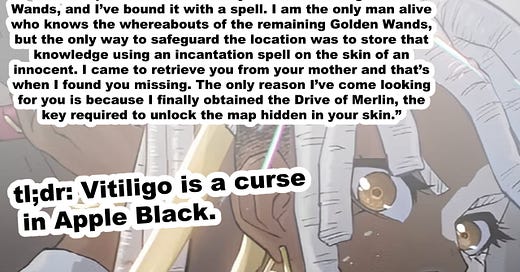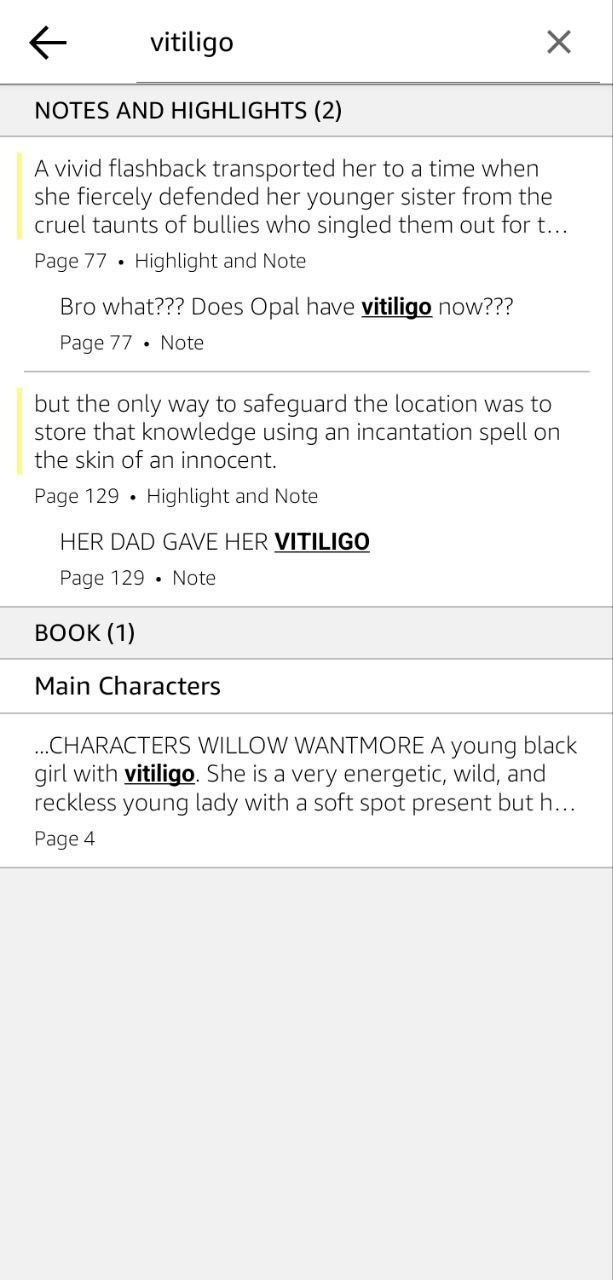Roasting "Apple Black Origins: The Spectrum and the Spectre" Chapters 7-8
Vitiligo is a curse in the Apple Black world. Apple Black is an anti-vitiligo series.
Chapter 7: Excommunicado
Opening Line:
In a dimly lit, smoke-filled chamber, the traders remain, their comrade dead after their failed attempt to defeat Gideon and Willow.
We meet Zenith, the leader of the rebels, who are after Gideon since he interrupted the unicorn heist. Zenith’s personality is identical to Black Maria, which means if they ever meet there’s going to be serious sexual tension.
Two of the thirteen ghosts disguise themselves, they tell Zenith they can help find Gideon, and an allegiance is formed.
Meanwhile, Harlem “Mom” Wantmore is at home worried sick. There’s been a lot of Mom Talk in this book, but this one was a little more interesting.
As Willow grew, so did the bond between mother and daughter. Harlem marveled at the spirited, curious child who transformed their home into a playground of imagination. Days of laughter, scraped knees, and bedtime stories became the fabric of their shared history.
“She’s a force of nature,” Harlem mused, her eyes sparkling with affectionate pride. “Opal, too. My beautiful, strong daughters.”
Harlem’s thoughts drifted to Willow’s skin, marked by a condition that painted her in hues distinct from societal norms. A beautiful mosaic of colors, a canvas adorned with patterns, told the story of a young girl who bore the weight of her perceived imperfection.
The vibrant, carefree child Harlem once knew began to retreat, overshadowed by the burden of self-consciousness. Rather than being celebrated as a testament to her individuality, Willow’s unique skin condition became a source of shame. Harlem could see it in the way Willow sometimes avoided her own reflection as if hoping to escape the judgment she imagined from the world.
“Willow, my precious one,” Harlem sighed, her heart aching for the innocence that had slipped away.
And dude, I feel that! It’s interesting seeing how Willow’s vitiligo shaped her personality, and I can feel that genuine Mother’s love for her child in this passage.
I can’t give my usual nitpicks this time around. This is a sincere and emotionally moving passage. Stephanie Williams did a fantastic job showing both Harlem’s anxiety and love.
We also get more of Harlem’s backstory. She’s a formerly enslaved person (didn’t expect things to suddenly get so bleak) and she’s worried that Willow might have been captured by slavers. This makes me wonder what’s the broader human rights situation over in Eden. But I said I wasn’t gonna nitpick, look at me, not nitpicking!!
The passage ends with Harlem hoping that Uzoh will be able to find their daughter. And, well… that took me out of the moment. I’m sorry! Look, this isn’t a nitpick— just hear me out, okay? We received this beautiful prose about how much this mother loves her daughter, and it ends with “maybe the dad will be able to do something.” It’s so laughably anti-climatic and regressive. Why couldn’t the mom be like, hey, I’m gonna risk it and go out and look for her? Why does she have to stay cooped up in the toadstool? (in this chapter, we learn that there’s framed photos nailed to the wall, which goes against typical renter’s agreement in most trailer park).
This story is driven by the male characters, with the female characters content to twiddle their thumbs. Sure, there’s Black Maria and Zenith, but they’re mostly there to pound their fists on the table and get outraged that their (male) subordinates aren’t listening. I don’t know if it’s better to have more chick characters who do fuckall, or if it’s better if the cast is a boys club that nicknamed their communal pocket pussy “bechdel test”
I know I spent all my speculation points last chapter, but jeez, I’d love to see the rough outline Stephanie Williams was handed for this book. If the excessive focusing on Harlem was her way to interject a smidgen of feminism in this story, that’s honestly incredible work. And if that is true, I take back all of the mean things I said about Harlem.
So the story cuts to Uzoh, who’s in the Pargon forest. He sees a “wanted” poster for Gideon and Willow, and gets pretty fucking angry since he assumes that Gideon kidnapped Willow. We get a peek into his enormous conflicting emotions, which, once again, was handled incredibly well.
All and all, this was easily the best chapter so far. It made me wonder what Stephanie Williams is capable of when she’s not weighed down by the constraints of a tie-in novel.
Chapter 8: Father
Opening Line:
The decision to leave the safety of the cave weighed heavily on Gideon and Willow as they ventured deeper into the Pargon forest.
And…. this impressive chapter was immediately followed with the most baffling and backwards chapter (so far) (look, if you forgot, I’m writing these reviews as I read each chapter, we’re in this together, bucko).
Uzoh finds Gideon and Willow, and starts a light saber fight with Gideon. They both break their Ebony barrier, resulting in a properly fired Chekov’s gun. When Uzoh is about to make a fatal strike to Gideon, Willow steps into the ring, in the ultimate “Fuck you Dad” move. Too bad the accompanying illustration shows her cowering in fear - actually, all of the illustrations in this have had a bit of wonkiness and haven’t always aligned with what’s happening on the page. This one stood out as especially odd (these mixed messages strengthens the case that there was a massive disconnect between everyone involved in the making of this book).
We’re then treated to Uzoh’s villain reveal speech. I’ll start with the more mild reveal that, in the book, is saved for last. Uzoh reveals he wanted sons, not daughters, and he only had kids to help complete his master keikaku. So that’s why he’s visiting less and less over the years.
This is a huge bummer of a reveal, but it makes sense, I guess. I previously got the sense that Uzoh was an autistic Indiana Jones who had too high of wanderlust to keep put at home. I assumed he does love his kids, he just sucks at being a dad. Turns out he was an outright misogynist, oops.
And now for the bigger reveal. We also learn Uzoh gave Willow vitiligo.
I don’t mean genetically, I mean her vitiligo is the result of a magic spell. Uzoh used her skin to store a secret map to the golden wands (and if you’re wondering where’s Opal, Uzoh clarifies that Opal was a backup in case anything happened to Willow).
And things get very gruesome:
As the map continued to reveal itself on Willow’s distressed skin, Gideon’s frustration grew into a burning anger. Willow continued to cry out in pain as the splotches of lighter skin began to move around like puzzle pieces.
So she wasn’t Born This Way™. It was her asshole father who “cursed” her with vitiligo. And I realized— does this book ever actually call it vitiligo? I did a quick search and:
Yup. They don’t say it in the actual story. Vitiligo is only referenced in the character description and official summary. Which is something typically delegated to a marketing team, not the author.
I see why this author went out of her way to not use “vitiligo” in the text. Because this is definitely not vitiligo (I am once again speculating how much of this was Stephanie William’s decision and rebelling against such an actively terrible book outline).
Either way, uh, the way they’re treating the character’s skin condition and the character design is identical to vitiligo. Which is something people have in real life. And it’s not caused by a curse!! Seriously, what in the fuck kind of regressive messaging is this!
I’m floored by how insensitive this is. I thought this book’s vitiligo talk was a bit clumsily, but this reveal? This? This is low. I know it’s safer to assume stupidity over malice, but making vitiligo a magic curse comes off as unnecessarily cruel (so the Saturday AM gang is dumber than we feared).
I will minecraft on the hill of free speech, but with the stipulation that there’s a time and a place for everything. Saturday AM’s whole deal is that they’re the diversity-first manga publishers. That’s what they push the most. Diversity in manga. Both from their artists and the stories.
And okay, if this vitiligo plot twist was in a schlocky horror B-movie, sure, it’d still be dumb and uninformed. But that’s what you expect for the genre and format. Especially since you’re only giving this hypothetical horror movie a try since you found the director’s Twitter and every day he tweets “I hate vitiligo” and you’re curious what a deranged vitiligo hater would do with a movie budget.
Finding this “Vitiligo is a curse” plot twist in a book from a publisher who pushes all things “diversity” makes it feel all the more vicious.
Remember back when I was speculating from the official description that this book is going to have a Rudolph the Red Nosed Reindeer plot twist? And how that’s kind of shitty? I didn’t think it would get so much worse. Hell, I thought this book’s only criminal offense was the bizarre groomer vibes. But competing for that spot is the revelation that our protagonist’s vitiligo is a magic curse!!!
Fuck, is this depressing. There wasn’t any warning that this would take such a drastic nosedive. I genuinely hope no one with vitiligo picked this book up because they wanted to see themselves represented.
I’ll be back to my usual roast style in the next installment. This plot twist knocked the wind out of me.





